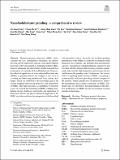Nanobiolubricant grinding: a comprehensive review
Author(s)
Song, Yu-Xiang; Li, Chang-He; Zhou, Zong-Ming; Liu, Bo; Sharma, Shubham; Dambatta, Yusuf Suleiman; Zhang, Yan-Bin; Yang, Min; Gao, Teng; Liu, Ming-Zheng; Cui, Xin; Wang, Xiao-Ming; Xu, Wen-Hao; Li, Run-Ze; Wang, Da-Zhong; ... Show more Show less
Download40436_2023_Article_477.pdf (4.928Mb)
Publisher with Creative Commons License
Publisher with Creative Commons License
Creative Commons Attribution
Terms of use
Metadata
Show full item recordAbstract
Minimum quantity lubrication (MQL), which considers the cost, sustainability, flexibility, and quality, has been actively explored by scholars. Nanoadditive phases have been widely investigated as atomizing media for MQL, aimed at enhancing the heat transfer and friction reduction performance of vegetable-oil-based biolubricants. However, the industrial application of nano-enhanced biolubricants (NEBL) in grinding wheels and workpiece interfaces as a cooling and lubricating medium still faces serious challenges, which are attributed to the knowledge gap in the current mapping between the properties and grindability of NEBL. This paper presents a comprehensive literature review of research developments in NEBL grinding, highlighting the key challenges, and clarifies the application of blind spots. Firstly, the physicochemical properties of the NEBL are elaborated from the perspective of the base fluid and nanoadditive phase. Secondly, the excellent grinding performance of the NEBL is clarified by its distinctive film formation, heat transfer, and multiple-field mobilization capacity. Nanoparticles with high thermal conductivity and excellent extreme-pressure film-forming properties significantly improved the high-temperature and extreme-friction conditions in the grinding zone. Furthermore, the sustainability of applying small amounts of NEBL to grinding is systematically evaluated, providing valuable insights for the industry. Finally, perspectives are proposed to address the engineering and scientific bottlenecks of NEBL. This review aims to contribute to the understanding of the effective mechanisms of NEBL and the development of green grinding technologies.
Date issued
2024-03-09Department
Massachusetts Institute of Technology. Department of Mechanical EngineeringJournal
Advances in Manufacturing
Publisher
Springer Science and Business Media LLC
Citation
Song, YX., Li, CH., Zhou, ZM. et al. Nanobiolubricant grinding: a comprehensive review. Adv. Manuf. (2024).
Version: Final published version
ISSN
2095-3127
2195-3597
Keywords
Industrial and Manufacturing Engineering, Polymers and Plastics, Mechanical Engineering, Mechanics of Materials